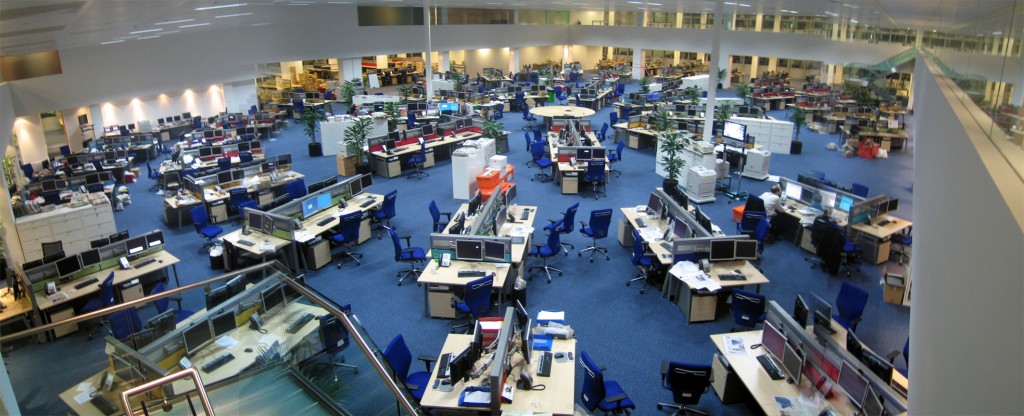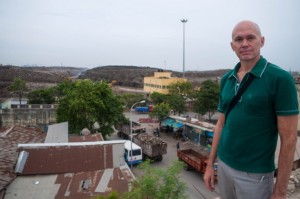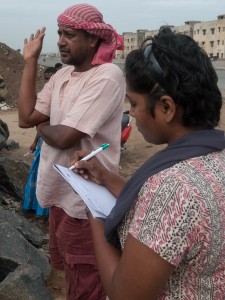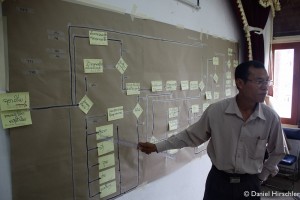Search Results for Tag: print
Journalists@Work: Pramila Krishnan
Pramila Modachur Krishnan is a senior reporter at the Deccan Chronicle, an English-language daily in Chennai, the capital of India’s Tamil Nadu state. Pramila’s parents are both farmers, and she was the first in her family to get a university education; she has both a bachelor’s and master’s degree. Now 27, she’s especially interested in reporting about the environment and issues facing women and children. In 2013, she took part in a DW Akademie workshop on environmental reporting in Chennai. Her pluck, resourcefulness and dedication convinced her trainers to recommend she attend the recent UN climate conference in Warsaw. onMedia asked her a few questions about her chosen career.
![]() read more
read more
Interview: New newsrooms mean more teamwork

CC image courtesy of victoriapeckham on Flickr
Many traditional newspaper publishers have completely restructured their newsrooms so that their print and online departments now work together. The way that they have done though varies enormously. In some, print and online journalists work side by side; in others, there is no distinction between the two departments at all.
Klaus Meier is a German media expert who has been closely observing exactly how media organizations are integrating their newsrooms. Together with researchers from Spain and Austria, Meier first published a detailed analysis of newsroom convergence in 2008. The team have done a follow up study this year.
DW Akademie’s Steffen Leidel talked to Klaus Meier about what newsrooms look like today and what these changes mean for the journalism of the future.
![]() read more
read more
What is the future of print journalism?
As more and more newspapers around the world feel the crunch of competition from the Internet, the big question is: what is going to happen to print? DW Akademie invited 11 newspaper managers and editors from countries as diverse as Kenya and Kyrgyzstan to Germany to explore ways of preparing and adapting their papers for a digital future. We asked some of them how they thought print journalism might evolve in the years to come. Here are their answers.

![]() read more
read more
South Asian journalists tackle climate change reporting

Kyle James has been conducting DW Akademie workshops in Asia and Central Asia since 2008, covering radio production, multimedia journalism and print.
The smell was nauseating and the sight quite a depressing one. The ten participants of the Climate Change Workshop in Chennai / India, along with the two trainers and our guide, had just scrambled up to the top of a building to get a better view of the Kodungaiyur dumpyard in the northern part of the city. We were there to see how waste disposal, unregulated construction, and short-sighted transportation and energy policies were harming the environment and contributing to climate change by releasing greenhouse gases and paving over important carbon sinks like wetlands.
![]() read more
read more
Creating confidence in the classroom
Active acquisition of knowledge to solve concrete challenges creates confidence. And that’s something you need when you have to teach journalism to a classroom full of young Laotian twentysomethings, as do the instructors at the National University of Laos (NUOL).
These instructors are currently students themselves: they’re taking part in journalism teachers’ training and coaching, which is organized in partnership with DW-AKADEMIE’s Asia team.
At a workshop in December we reviewed some of the progress made so far. “I have more confidence in teaching these subjects now,” said one of the younger colleagues. Others agreed.
One senior lecturer brought along a revamped version of a project the training participants had created the previous September – a newspaper made from scratch. It was a showcase item at NUOL’s 15th anniversary celebration in November.
The instructors-in-training had put tremendous effort into producing it, and that has really paid off in their daily work. Here’s why:
![]() read more
read more






Feedback